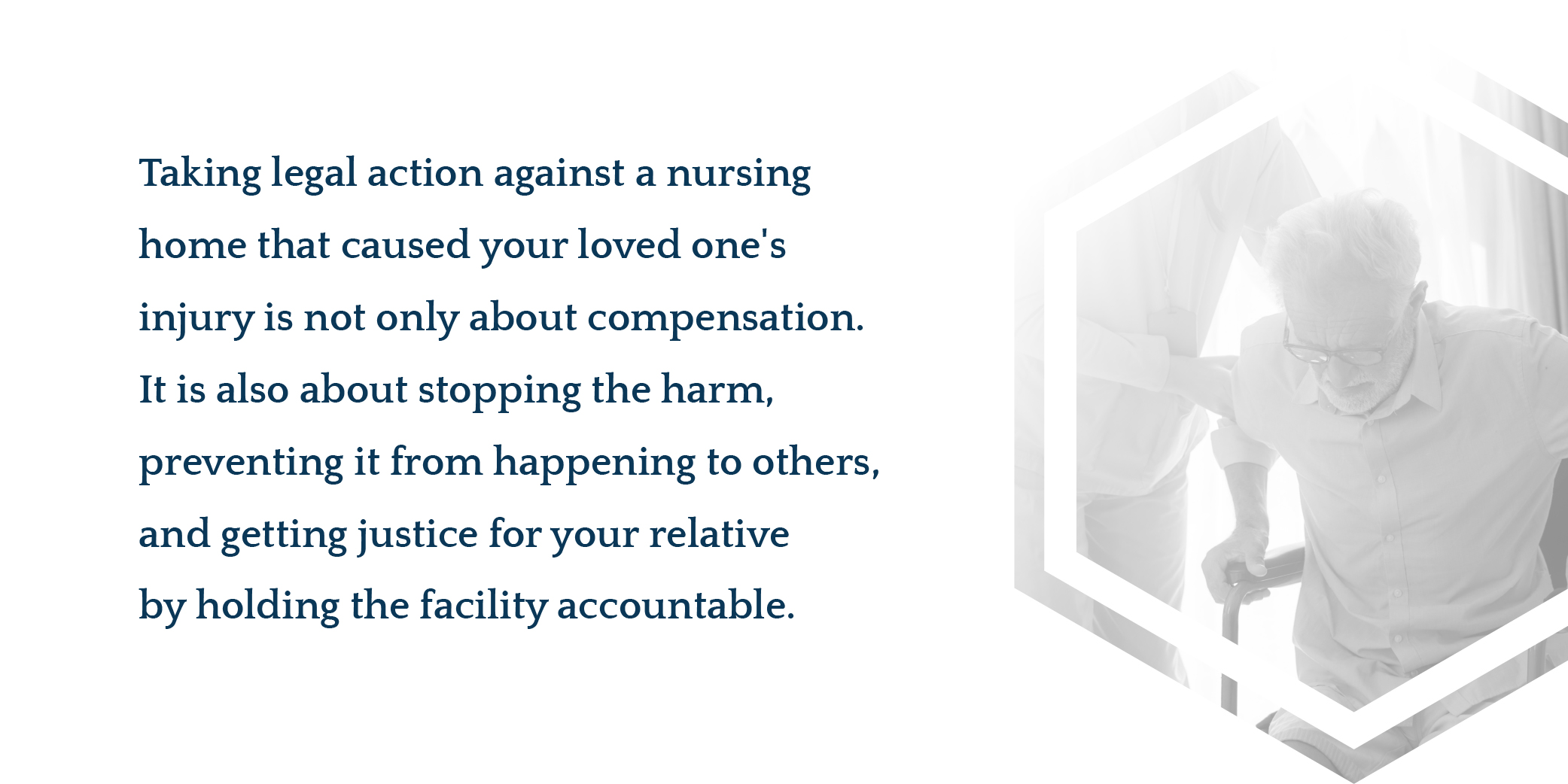
When a loved one is harmed in a nursing home, families rightfully feel betrayed, confused, and uncertain about what to do next. Filing a lawsuit may seem like a last resort, but in cases of neglect, abuse, or severe injury, it is often the only way to hold the facility accountable and ensure your relative receives justice.
If you suspect that a nursing home has allowed harm to come to your parent or family member, it is important to understand how the legal process of a lawsuit against a nursing home works. While every case is different, most follow a similar structure.
Our firm is a small, focused division within a large and well-resourced practice. That means you get personalized service from a dedicated Peoria nursing home injury lawyer without sacrificing access to medical experts, experienced litigators, or financial strength. We offer free consultations and handle all cases on a contingency basis, so you do not pay unless we win.
When Should You Consider Legal Action Against a Nursing Home?
Not every injury in a nursing home is caused by negligence, but many are. Staff shortages, lack of supervision, poor training, and profit-driven management decisions can all contribute to unsafe conditions.
Some of the most common causes of nursing home injury or neglect lawsuits include:
- Repeated falls, unexplained bruises, or fractures
- Bedsores, especially Stage III or IV ulcers
- Dehydration, malnutrition, or rapid weight loss
- Medication errors, such as overdoses or missed doses
- Financial exploitation, physical abuse, sexual assault, or verbal degradation
If you suspect any of the above, do not wait for the nursing home to “explain.” These situations violate the Illinois Nursing Home Care Act and demand immediate legal intervention.
Nursing Home Lawsuit Step 1: Investigating and Gathering Evidence
The first step in suing a nursing home is a thorough investigation. Your attorney will begin by listening carefully to your account of what happened and requesting any relevant records you may have, such as medical reports, photographs of injuries, text messages, or staff notes.
With your permission, your lawyer will obtain your loved one’s medical records, both from the nursing home and from any hospitals or doctors who treated them. These records are key to identifying when an injury occurred and whether staff acted appropriately.
Your attorney may also:
- Review staff schedules to determine if the facility was understaffed
- Interview witnesses, including other residents, family members, or former employees
- Consult medical experts who can testify about what should have been done
- Analyze facility inspection reports or violations from the Illinois Department of Public Health
- Secure surveillance footage if available
The sooner this process begins, the more likely it is that crucial evidence can be preserved. Many nursing homes destroy or “lose” records after a short period, and witness memories can fade with time.
Nursing Home Lawsuit Step 2: Filing a Lawsuit
If the evidence supports a claim, your attorney will file a formal complaint in the appropriate court. In Peoria County, most nursing home cases are filed in civil court. The complaint outlines the facts of the case, the injuries suffered, and the legal basis for your lawsuit, such as negligence or wrongful death.
The nursing home (or its corporate owner) will then be served and required to respond. They may deny the allegations outright, or they may admit certain facts but argue that the injury was unavoidable. This begins what is known as the litigation phase.
Nursing Home Lawsuit Step 3: Pre-Trial Discovery and Negotiation
Once the lawsuit is underway, both sides engage in discovery, which is a formal process of exchanging evidence. Your attorney may take depositions (sworn statements) from nursing home staff, administrators, and corporate representatives. Both sides may hire expert witnesses to provide opinions on whether the standard of care was breached.
During this phase, your lawyer will also work to quantify your damages. In a nursing home injury case, damages may include compensation for medical bills, funeral expenses, pain and suffering, and even punitive damages in cases of egregious misconduct.
Most nursing home cases are resolved through negotiation before trial. This is not a sign of weakness; it is often in the best interest of the victim’s family. A settlement can provide financial relief and closure more quickly, without the uncertainty of a trial. However, not every case settles. If the nursing home denies liability or offers an inadequate amount, your attorney must be prepared to go to court.
Nursing Home Lawsuit Step 4: Trial and Verdict
If no settlement is reached, the case proceeds to trial. In Peoria County, nursing home trials are heard before a judge or a jury. Trials may last days or weeks, depending on the complexity of the case and the number of witnesses.
Your attorney will present evidence, question witnesses, cross-examine the defense’s experts, and argue for the full compensation your loved one deserves. The nursing home’s attorneys will attempt to show that they acted reasonably or that the injury was caused by something else, such as a pre-existing condition.
A trial ends with a verdict. If you prevail, the court will award damages. If the nursing home loses, it may appeal, or in many cases, seek to settle quickly after losing at trial.

What Makes a Nursing Home Case Strong?
While every case has its own facts, certain factors tend to make a claim stronger:
- Clear evidence of injury (photos, hospital records, coroner’s reports)
- Documentation of prior complaints against the facility
- Patterns of understaffing or falsified charts
- Witnesses who can speak to the resident’s condition and care
- A timeline that links staff neglect directly to the injury
Even if the resident had significant pre-existing health conditions, that does not absolve the facility of responsibility. Nursing homes are trusted with vulnerable lives, and their failure to uphold that trust can be fatal.
In Illinois, the statute of limitations for nursing home injury lawsuits is usually two years from the date of the injury or from when the injury should have been discovered. But waiting that long can seriously compromise your case.
If you suspect abuse, neglect, or wrongdoing, contact us as soon as possible. Early legal action is not only about compensation. It is also about stopping the harm, preventing it from happening to others, and giving your loved one the dignity and protection they deserve.
Contact a Peoria County, IL Nursing Home Lawsuit Attorney
If your loved one was injured, neglected, or mistreated in a nursing home, do not face the legal system alone. Contact a Peoria, IL nursing home injury lawyer at Nursing Home Injury Center today. Call 309-524-6900 to take the first step toward justice and accountability with a free consultation.



